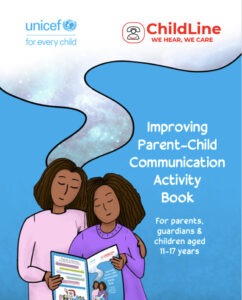Explanation of Physical Abuse
Have you ever gotten punished for doing something wrong? Stealing, cheating or lying- these things usually get us into trouble. We may get ‘licks,’ get banned from watching television, or even get lines to write. The punishment we get when we did something wrong is called discipline. Usually, we learn our lesson, and try not to do it again. However, there are times when parents or caregivers do harmful things to children even when they did not do anything wrong. Sometimes, adults may hit or beat a child, not as a form of discipline, but because they are angry. This is called physical abuse.
Physical Abuse is when a parent or caregiver intentionally injures a child. Acts such as kicking, biting, hitting, pushing and choking are behaviours most often associated with physical abuse. Even an act such as locking a child in small space or closet is considered physical abuse, because of the harmful effect on the child.
Why Does It Happen?
Many times, a child may be abused because the parent or caregiver loses his or her temper. It may be because there are other things bothering the adult, like job stress or relationships difficulties, and that person is not able to handle their emotions in a healthy way. Intense feelings of sadness, not having many friends to talk to, and the use of alcohol and other drugs make it more likely for a person to behave in abusive ways.
Indicators of Physical Abuse
These are some things you can look out for. If someone is being physically abused, we might see:
- bite marks
- unusual bruises
- tears in the skin
- burns
- frequent accidents or injuries
- fractures in unusual places
- injuries, swellings to face and extremities
- discoloration of skin
A person who is being abused may:
- avoid physical contact with others
- become nervous when other children cry
- wear clothing to purposely conceal injury, i.e. long sleeves
- make up stories about how they got injured
- seem frightened by parents or caretakers
- often be late or absent from school
- come to school early, or may not want to go home afterwards
- have difficulty getting along with others,
- little respect for others
- keep to themselves
- play rough, and may even hurt others
- feel pain when making certain movements
- run away from home
- report abuse by parents or caregivers
What To Do
If you think that you are being physically abused, there are places where you can get help. You can tell someone who you trust- a teacher, principal, family member or friend. You can also call ChildLine at 800-4321 or 131 and we will be able to help you. Getting help for physical abuse involves getting treated for injuries by a doctor, finding a safe place to stay away from the abuse, and counselling to help you cope with what has happened. The important thing to know is that it is never your fault if someone abuses you. It is because that person who is abusing you has problems expressing their anger which must be addressed. If you know anyone who you believe has been abused, you should get help for that person by calling ChildLine or by telling an adult who can help.
Resources
http://www.safechild.org/childabuse2.htm
http://www.healthyplace.com/abuse/child-physical-abuse/physical-abuse-children/menu-id-52/
http://www.hmc.psu.edu/childrens/healthinfo/pq/physicalabuse.htm
Additional Information
http://helpguide.org/mental/child_abuse_physical_emotional_sexual_neglect.htm
http://helpguide.org/mental/domestic_violence_abuse_types_signs_causes_effects.htm








